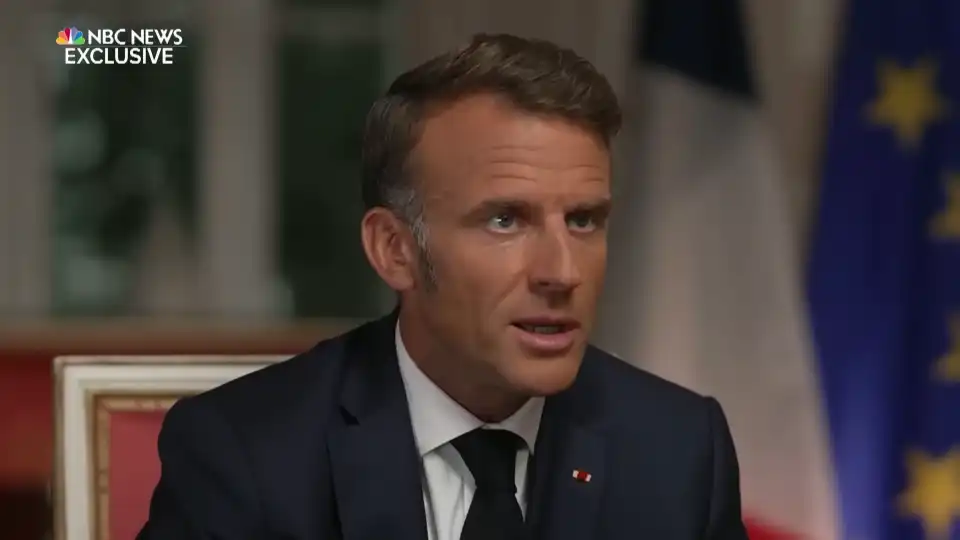When French President Emmanuel Macron sat down after his high-stakes White House meeting on August 18, his message was clear: Europe, the U.S., and Ukraine want peace—but not at the cost of security or sovereignty. I’ve followed Macron’s speeches closely before, but this interview really stood out because of how blunt he was about both the urgency of a ceasefire and the long-term need for binding security guarantees.
Table of Contents
What Happened at the White House Meeting
Macron described the session with President Zelensky, President Trump, and European leaders as a turning point. The group agreed on three immediate objectives:
- Stop the killings – Macron stressed that whether we call it a truce, a ceasefire, or an armistice, the humanitarian priority is halting civilian deaths.
- Work on security guarantees – The coalition of 30 countries formed earlier this year (co-chaired by the UK and France) will now coordinate with the U.S. to provide Ukraine with long-term deterrence against future aggression.
- Plan leadership talks – A bilateral meeting between Zelensky and Putin is being prepared, followed by a trilateral session with Trump, and eventually expanded into a multilateral peace conference including Europeans and possibly Turkey.
From my perspective, that last part feels ambitious but necessary. If they can actually get Putin, Zelensky, and Trump to sit at the same table, it could reset the diplomatic process.
Macron on Trump’s Confidence in a Deal
At one point, Trump was overheard telling Macron, “I think he [Putin] wants to make a deal.” Macron’s response in the interview was cautious optimism: if a deal includes robust peace terms and security guarantees, then it’s good news.
But he kept repeating one key condition: any peace must not be detrimental to Ukraine or Europe. For me, that line showed Macron’s balancing act—welcoming Trump’s confidence while reminding everyone that Ukraine can’t be forced into a bad compromise.
Ceasefire vs. Truce – Why the Words Matter
Macron was adamant that hostilities must pause if negotiations are to succeed. He pointed out the contradiction of Zelensky trying to negotiate peace while Russia launched strikes on civilians at the very same moment.
He also revealed that Trump had already pushed for a ceasefire in February, and Zelensky accepted one in March at Doha. The sticking point, Macron said, has always been Putin’s refusal. From my point of view, this shows how language—“ceasefire,” “truce,” “pause”—is less important than whether Moscow actually complies.
Security Guarantees – What They Could Look Like
This part of Macron’s remarks struck me as the most detailed and forward-looking. The plan has two pillars:
- A strong Ukrainian army – with no limits on soldiers, ammunition, or modern systems like Patriots and aircraft. Macron stressed that Ukraine’s self-defense is the first line of deterrence.
- International backing without foreign boots on the ground – partners like France, the UK, Turkey, and now the U.S. would support Ukraine with training, equipment, and coordinated air/sea presence to send a “strategic signal” to Russia.
He invoked the failed Budapest Memorandum of the 1990s as a warning—this time, he insisted, the guarantees must be real and enforceable.
The Land Swap Question
When pressed on whether Ukraine might have to give up territory, Macron was blunt: that decision belongs only to Ukraine and its people. He warned that recognizing land taken by force would destroy the international order, undermining credibility in conflicts from Africa to Taiwan.
As someone who has followed this war since 2022, I think that’s one of Macron’s strongest arguments. Any acceptance of Russian annexation would set a precedent no European leader can afford.
Macron’s Optimism vs. Reality
He admitted that he doesn’t see Putin as “very willing” to agree to peace right now. Still, he insisted that keeping the process alive—bilateral, trilateral, and multilateral talks—is crucial. If Russia resists, Macron said Europe and the U.S. must be ready to increase sanctions and tariffs to raise pressure.
For me, that felt like Macron signaling two tracks: diplomacy if possible, escalation if necessary.
Why This Matters Beyond Ukraine
Macron closed with a point that resonated: Ukraine’s security is tied directly to Europe’s—and to the credibility of the international order. If the West allows borders to be changed by force in Ukraine, it sends the wrong message everywhere else.
As he put it, “the way we will behave in Ukraine will be a test for our collective credibility in the rest of the world.”
More Topics
- Judge Denies Bond for Carroll County Teen Accused of Murdering Mother and Stepfather
- Christian Bale’s Project “Together California” to Revolutionize Foster Care
- Phil Knight’s $2 Billion Donation – Philanthropy vs. Taxation
- The Death of Gary Webb: A Tragic Suicide or a Silenced Journalist
- Rachel Scott Recognized for Challenging Vladimir Putin at Summit
- Mark Zuckerberg Spends $110 Million on Palo Alto Compound
- What Happened to Spanish Actress Ana Obregón’s Son – Welcomes Granddaughter via Surrogacy

